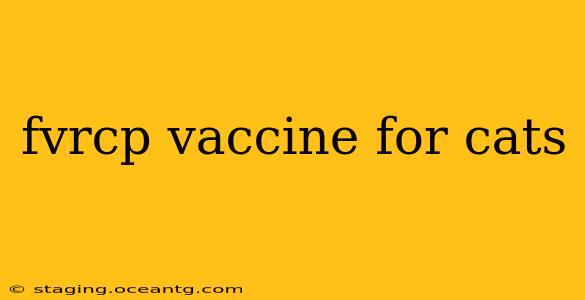Feline Viral Rhinotracheitis, Calicivirus, and Panleukopenia (FVRCP) are highly contagious diseases that can severely impact a cat's health. The FVRCP vaccine is a crucial part of preventative care for felines, protecting them against these potentially devastating illnesses. This comprehensive guide will delve into everything you need to know about the FVRCP vaccine, addressing common questions and concerns cat owners often have.
What is the FVRCP Vaccine?
The FVRCP vaccine is a combination vaccine protecting cats against three common and serious viral infections:
-
Feline Viral Rhinotracheitis (FVR): Also known as feline herpesvirus type 1 (FHV-1), FVR causes upper respiratory infections characterized by sneezing, coughing, eye discharge, and fever. In severe cases, it can lead to pneumonia and even death, especially in kittens.
-
Feline Calicivirus (FCV): FCV is another virus that causes upper respiratory infections, often with more severe symptoms than FVR. These can include oral ulcers, fever, and lameness. Like FVR, FCV can be fatal, particularly in young cats.
-
Feline Panleukopenia (FPV): Often called feline distemper, FPV is a highly contagious and often fatal virus that attacks the bone marrow, leading to a significant decrease in white blood cells. This leaves the cat vulnerable to secondary infections and can cause severe vomiting, diarrhea, and dehydration.
The FVRCP vaccine is typically administered as a series of injections, starting at a young age. It's a core vaccine, meaning it's considered essential for all cats, regardless of lifestyle.
How Often Should Cats Receive the FVRCP Vaccine?
The vaccination schedule can vary slightly depending on your veterinarian's recommendations and your cat's individual needs. However, a common schedule involves:
-
Initial Vaccination: Kittens typically receive their first FVRCP vaccination around 6-8 weeks of age. A series of two or three vaccinations, spaced 2-4 weeks apart, is usually recommended to build up immunity.
-
Booster Shots: After the initial series, booster shots are generally given annually to maintain protection. Your vet may recommend a different schedule depending on your cat's risk factors, such as exposure to other cats or travel.
What are the Side Effects of the FVRCP Vaccine?
The FVRCP vaccine is generally safe and well-tolerated, but some mild side effects can occur. These might include:
- Lethargy: Your cat may seem more tired or less active than usual for a day or two after the vaccination.
- Mild Fever: A slight increase in temperature is possible.
- Soreness at the Injection Site: Some cats may show slight swelling or discomfort at the injection site.
- Loss of Appetite: A temporary decrease in appetite is also a possibility.
These side effects are usually temporary and resolve on their own. If you notice any severe or persistent side effects, contact your veterinarian immediately.
Is the FVRCP Vaccine Safe for Kittens?
Yes, the FVRCP vaccine is generally safe for kittens, though it's crucial to follow the recommended vaccination schedule provided by your veterinarian. Very young kittens may have a less robust immune response, making the series of shots necessary.
Can My Cat Still Get Sick Even After Receiving the FVRCP Vaccine?
While the FVRCP vaccine is highly effective, it doesn't guarantee 100% protection. The vaccine significantly reduces the risk of developing these diseases, but there's still a small chance your cat could get sick. The severity of the illness would likely be milder than in unvaccinated cats. Factors such as the strain of the virus and your cat's overall health can influence the effectiveness of the vaccine.
What if My Cat is an Indoor Cat? Does it Still Need the FVRCP Vaccine?
Even indoor cats can be exposed to these viruses. The virus can be carried on clothing, shoes, or even through open windows. Therefore, vaccination remains essential for all cats, regardless of their lifestyle.
How Much Does the FVRCP Vaccine Cost?
The cost of the FVRCP vaccine varies depending on your location and veterinarian. It's best to contact your local veterinary clinic for a price quote. Remember, the cost of the vaccine is far less than the potential cost of treating these diseases.
This information is for general knowledge and does not substitute professional veterinary advice. Always consult with your veterinarian to discuss the appropriate vaccination schedule and preventative care for your cat. They can assess your cat's individual needs and recommend the best course of action.
